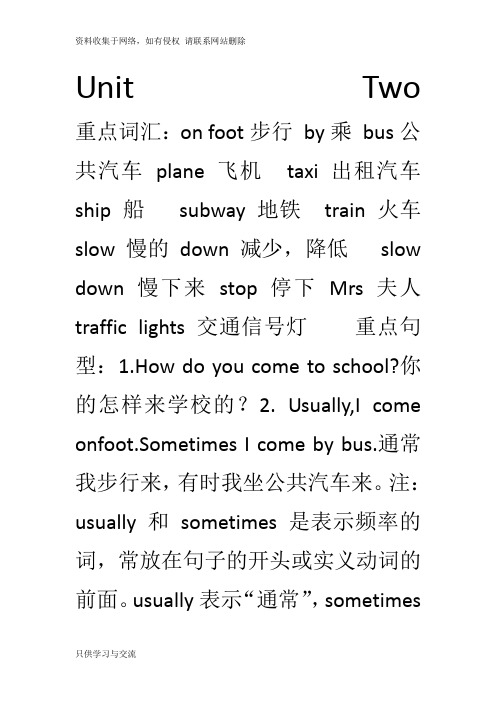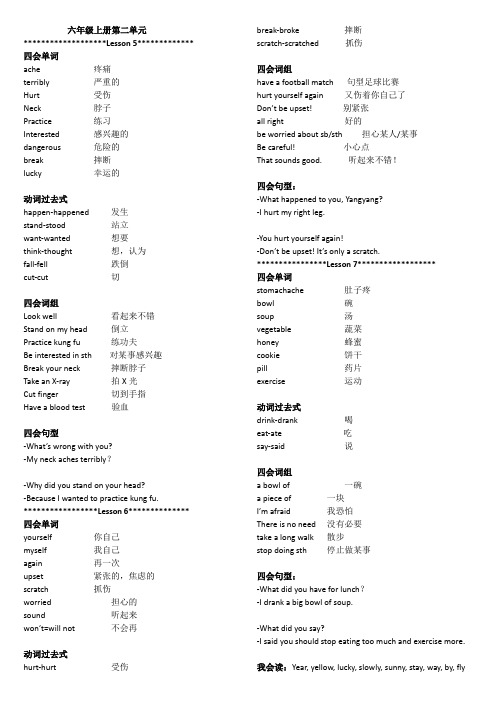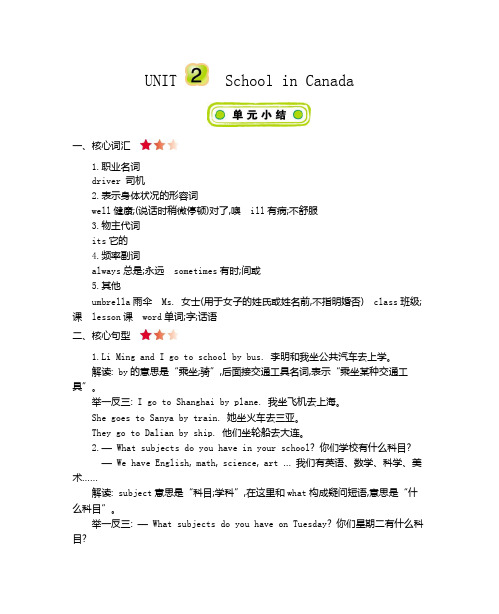六年级上英语——第二单元词汇篇
新人教版六年级英语第二单元重点词汇,句型总结

Unit Two 重点词汇:on foot步行by乘bus公共汽车plane飞机taxi出租汽车ship船subway地铁train 火车slow慢的down减少,降低slow down慢下来stop停下Mrs夫人traffic lights交通信号灯重点句型:1.How do you come to school?你的怎样来学校的?2. Usually,I come onfoot.Sometimes I come by bus.通常我步行来,有时我坐公共汽车来。
注:usually和sometimes是表示频率的词,常放在句子的开头或实义动词的前面。
usually表示“通常”,sometimes
表示“有时候”.3.Slow down and stop at a yellow light.黄灯缓行并且停一停。
4. Stop and wait at a red light.红灯停一停并且等一等。
5.Go at a green light. 绿灯行。
6.Don't go at a light.红灯勿行。
注:在祈使句前加Don't 构成否定。
1.It’s so good __(see)you.
2.Chinese food __(be)so different from British food.
3.Let’s__(take) a bus home.
4.We must__(look) right before __(cross) the road.
5.There__(be)no door on the bus.。
六年级上册英语第二单元知识点

六年级上册英语第二单元知识点六年级上册英语知识点归纳Unit2: Ways to go to school一、重点单词和短语1.四会词汇:XXX乘公交车XXX,乘飞机XXX乘出租车by ship乘船by XXX乘地铁XXX乘火车by XXX骑自行车slow down慢下来stop停止wait等go走了解:by…= takea / the…例如:by bus = take a / the bus2.频率副词:(次数从多到少)always总是。
usually通常。
often经常。
sometimes有时。
never从不3.其他:pay attention to注意by ferry乘轮渡by sled滑雪橇cross the road横穿马路traffic light(s)通信号灯at home在家missed (miss的过去式)想念different不同的same相同的cross穿过lookright向右看chopsticks筷子(复数)door门look at朝……看play with和……一同玩XXX好极了2、按要求写单词:go (反义词)come。
foot(复数)feet。
child(复数)childrengood(反义词)bad坏的take带走(反义词)bring拿来slow慢的(反义词)quick/fastgo(过去式)went。
do(过去式)did。
do(第三人称单数)doesgo(第三人称单数)goes。
same相同的(反义词)different不同的miss(过去式)missedwrong毛病(反义词)right精确can(否认体式格局)can’t。
early早的(反义词)late晚的3、重点句子(一)四会句子1.--- How do you come to school?你(们)怎样来黉舍的?--- Usually。
I come on foot。
= Usually。
I walk.通常情况下,我步行来。
六年级上册unit2单词

六年级上册unit2单词Unit 2 Ways to go to school.一、交通工具类。
1. by [baɪ] (prep.)- 表示通过某种交通方式,如“by bike”(骑自行车),“by bus”(乘公共汽车)等。
2. bus [bʌs] (n.)- 公共汽车,复数形式为“buses”。
例如:I take the bus to school.(我乘公共汽车去上学。
)3. plane [pleɪn] (n.)- 飞机。
例如:He goes to another city by plane.(他乘飞机去另一个城市。
)4. taxi ['tæksi] (n.)- 出租车。
例如:Sometimes she takes a taxi to work.(有时候她乘出租车去上班。
)5. ship [ʃɪp] (n.)- 船。
例如:They go to the island by ship.(他们乘船去那个岛。
)6. subway ['sʌbweɪ] (n.)- 地铁,美式英语用法,英式英语是“underground”或者“tube”。
例如:Many people take the subway in big cities.(在大城市很多人乘地铁。
)7. train [treɪn] (n.)- 火车。
例如:We go to Beijing by train.(我们乘火车去北京。
)二、交通规则与相关词汇。
1. slow down [sləʊ daʊn] (phr.)- 减速。
例如:You should slow down at the crossing.(在十字路口你应该减速。
)2. stop [stɒp] (v.)- 停止;(n.)车站。
例如:The bus stop is over there.(公共汽车站在那边。
)作动词时,例如:Stop at the red light.(红灯停。
京版英语六年级上册第二单元词汇整理

六年级上册第二单元*******************Lesson 5************* 四会单词ache 疼痛terribly 严重的Hurt 受伤Neck 脖子Practice 练习Interested 感兴趣的dangerous 危险的break 摔断lucky 幸运的动词过去式happen-happened 发生stand-stood 站立want-wanted 想要think-thought 想,认为fall-fell 跌倒cut-cut 切四会词组Look well 看起来不错Stand on my head 倒立Practice kung fu 练功夫Be interested in sth 对某事感兴趣Break your neck 摔断脖子Take an X-ray 拍X光Cut finger 切到手指Have a blood test 验血四会句型-What’s wrong with you?-My neck aches terribly?-Why did you stand on your head?-Because I wanted to practice kung fu.*****************Lesson 6************** 四会单词yourself 你自己myself 我自己again 再一次upset 紧张的,焦虑的scratch 抓伤worried 担心的sound 听起来won’t=will not 不会再动词过去式hurt-hurt 受伤break-broke 摔断scratch-scratched 抓伤四会词组have a football match 句型足球比赛hurt yourself again 又伤着你自己了Don’t be upset! 别紧张all right 好的be worried about sb/sth 担心某人/某事Be careful! 小心点That sounds good. 听起来不错!四会句型:-What happened to you, Yangyang?-I hurt my right leg.-You hurt yourself again!-Don’t be upset! It’s only a scratch.****************Lesson 7******************四会单词stomachache 肚子疼bowl 碗soup 汤vegetable 蔬菜honey 蜂蜜cookie 饼干pill 药片exercise 运动动词过去式drink-drank 喝eat-ate 吃say-said 说四会词组a bowl of 一碗a piece of 一块I’m afraid 我恐怕There is no need 没有必要take a long walk 散步stop doing sth 停止做某事四会句型:-What did you have for lunch?-I drank a big bowl of soup.-What did you say?-I said you should stop eating too much and exercise more. 我会读:Year, yellow, lucky, slowly, sunny, stay, way, by, fly。
六(上)冀教版英语 Unit 2 知识重点

UNIT School in Canada一、核心词汇1.职业名词driver 司机2.表示身体状况的形容词well健康;(说话时稍微停顿)对了,噢ill有病;不舒服3.物主代词its它的4.频率副词always总是;永远sometimes有时;间或5.其他umbrella雨伞Ms. 女士(用于女子的姓氏或姓名前,不指明婚否) class班级;课lesson课word单词;字;话语二、核心句型1.Li Ming and I go to school by bus. 李明和我坐公共汽车去上学。
解读: by的意思是“乘坐;骑”,后面接交通工具名词,表示“乘坐某种交通工具”。
举一反三: I go to Shanghai by plane. 我坐飞机去上海。
She goes to Sanya by train. 她坐火车去三亚。
They go to Dalian by ship. 他们坐轮船去大连。
2.— What subjects do you have in your school?你们学校有什么科目?— We have English, math, science, art …我们有英语、数学、科学、美术……解读: subject意思是“科目;学科”,在这里和what构成疑问短语,意思是“什么科目”。
举一反三:— What subjects do you have on Tuesday?你们星期二有什么科目?— We have English and math. 我们有英语和数学。
3.— How many classes do you have each school day?你们每天有多少节课?— Three classes in the morning and two in the afternoon. 上午三节课下午两节课。
解读:“How many”表示“多少”,问可数名词的数量。
do是个助动词,无实际意义。
六年级上册英语第2单元知识点

六年级上册英语第2单元知识点外研版六年级上册英语第2单元的知识点包括词汇、语法、日常用语和听力等部分。
一、词汇本单元学习了以下单词:usually 通常sometimes 有时twice 两次a week 一周一次a month 一个月一次at the weekend 在周末do homework 做家庭作业watch TV 看电视read books 读书eat dinner 吃晚饭get up 起床go to bed 上床睡觉go to school 去上学go to the park 去公园go shopping 去购物play football 踢足球play basketball 打篮球play table tennis 打乒乓球play computer games 玩电脑游戏play with toys 玩玩具go for a walk 去散步do morning exercise 做早操eat breakfast 吃早饭eat lunch 吃午饭eat supper 吃晚饭have a rest 休息一下listen to music 听音乐listen to the radio 收听广播water the flowers 浇花clean the room 打扫房间wash clothes 洗衣服do housework 做家务活。
二、语法和日常用语1.在一般现在时中,当句子主语是第三人称单数时,动词要变第三人称单数形式。
如:He usually goes to school by bike。
他通常骑自行车上学。
2.情态动词“can”表示能力,肯定回答用“Yes, I can”,否定回答用“No,I can’t”。
如:—Can you speak French?你会说法语吗?—Yes, I can是的,我会。
—No,I can’t不,我不会。
3.询问别人某件事情是否喜欢做或习惯做的表达方法为“Do you like/love/enjoy doing sth?”或“Do you often/usually/sometimes do sth?”。
最新完整版人教版六年级英语上册第二单元知识点归纳总结及作文范文
Unit 2 Ways to go to school一、词汇与短语1、重点单词1. by /bai/ (表示方式)乘2.bus /bʌs/ 公共汽车3.plane /plein/ 飞机4.taxi /'tæksi/ 出租汽车5.ship /ʃɪp/ (大)船6.subway /'sʌbwei/ 地铁7.train /trein/ 火车8.slow /sləʊ/ 慢的9.down /daʊn/ 减少;降低10.stop /stɒp/ 停下11.Mrs /'mɪsɪz/ 夫人12.early /ˈɜːlɪ/ 早到的13.helmet /'helmɪt/ 头盔14.must /mʌst , məst]/ 必须15.wear /weə(r)/ 戴;穿16.attention /əˈtenʃn/ 注意17.traffic /ˈtræfɪk/ 交通18.sled /sled/ 雪橇19.fast /fɑːst/ 快速的20.ferry /ˈferɪ/ 轮渡2、重点短语1. on foot 步行2.slow down 慢下来3.pay attention to 注意4.traffic lights 交通信号灯5.go to school 去上学6.by+交通工具乘……7.at a +颜色+light. 在……灯的时候8.stop and wait 停下来等9.talk about 谈论10.a sports meet 运动会11.good exercise 良好的锻炼12.go to the nature park 去自然公园13.the bus is coming 公共汽车来了14.look right/left 向右/向左看15.across the road 穿过马路16.be different from 和…不同17.the same as 与……相同3、重点句子1. How do you go/come/get to school? 你你你去/你/到达你你你你Usually, I come on foot. /I usually come on foot. 通常我走路来。
六年级上册英语第二单元单词重点
六年级上册英语第二单元单词重点1. Education:- Homework: Work assigned by teachers to complete at home.- Test: An evaluation of knowledge or skill.- Classroom: A room where students receive instruction from a teacher.- Teacher: A person who instructs and guides students in a classroom.- Student: A person who attends school and learns from a teacher.2. Family:- Father: A male parent.- Mother: A female parent.- Brother: A male sibling.- Sister: A female sibling.- Grandparents: The parents of one's parents.3. Food:- Breakfast: The first meal of the day.- Lunch: A midday meal.- Dinner: The evening meal.- Fruit: Edible, usually sweet, product of a plant.- Vegetables: Edible parts of a plant, other than fruit, used as food.4. Sports:- Football: A game played with a round ball and two teams, each aiming to score goals.- Basketball: A game played with a ball and two teams, trying to throw it through a hoop to score points.- Tennis: A sport played with a racket and a ball over a net.- Swimming: The act of moving through water using one's body.- Running: Moving swiftly using one's legs.5. Transportation:- Car: A motor vehicle used for transportation.- Bicycle: A vehicle with two wheels, propelled by pedals.- Bus: A large motor vehicle used for carrying passengers.- Train: A form of transportation that runs on tracks.- Plane: An aircraft designed for air travel.6. Weather:- Sunny: Describes weather with plenty of sunshine.- Cloudy: Describes weather with many clouds.- Rainy: Describes weather with falling rain.- Windy: Describes weather with strong winds.- Stormy: Describes weather with a storm, including lightning and thunder.7. Emotions:- Happy: Feeling pleasure or contentment.- Sad: Feeling sorrow or unhappiness.- Angry: Feeling strong displeasure or hostility.- Excited: Feeling great enthusiasm.- Scared: Feeling afraid or frightened.8. Actions:- Jump: To push oneself off the ground and into the air.- Run: To move swiftly by foot.- Swim: To move through water using one's body.- Dance: To move rhythmically to music.- Sing: To produce musical sounds with the voice.9. Time:- Morning: The time from sunrise to noon.- Afternoon: The time from noon to sunset.- Evening: The time from sunset to bedtime.- Night: The time from bedtime to sunrise.- Weekend: The two-day period from Saturday to Sunday.10. Colors:- Red: The color resembling the hue of blood.- Blue: The color of the clear sky or the deep sea.- Green: The color of grass or leaves.- Yellow: The color resembling the hue of gold or ripe lemons.- Purple: The color between red and blue, like that of a plum.11. Animals:- Dog: A domesticated carnivorous mammal that typically has a long snout, an acute sense of smell, non-retractile claws, and a barking, howling, or whining voice.- Cat: A small domesticated carnivorous mammal with soft fur, a short snout, and retractile claws. It is widely kept as a pet or for catching mice, and many breeds are known.- Bird: A warm-blooded egg-laying vertebrate distinguished by the possession of feathers, wings, a beak, and typically by being able to fly.- Fish: A limbless cold-blooded vertebrate animal with gills and fins living typically in water.- Horse: A large solid-hoofed herbivorous ungulate mammal domesticated for riding, racing, and working.12. Jobs:- Doctor: A qualified medical practitioner.- Teacher: A person who teaches, especially in a school.- Firefighter: A person whose job is to extinguish fires and rescue people.- Police Officer: A member of a police force.- Chef: A professional cook, typically the chief cook in a restaurant or hotel.。
陕旅版小学六年级上册英语Unit 2 重点词汇
Unit 2 重点词汇:take a walk 散步play ping-pong 打乒乓球play tennis 打网球go boating 划船go skating 滑冰go shopping 购物 a lot of 许多how often 多久一次once 一次twice 两次study学习do well in 在......做得好run after 追赶keep healthy保持健康重点句型:1.I’m healthy. 我是健康的。
2.—How often do you drink milk? 你多久喝一次牛奶?—I drink milk every day. 我每天喝一次牛奶。
3.—How often does Li Shan go skating? 李珊多久滑一次冰?—She goes skating once a week.她一周滑一次冰. twice a week4.You look healthy. 你看起来很健康。
5.I eat a lot of fruits and vegetables. 我吃许多水果和蔬菜。
6.She does well in her study. 她在学习方面表现得好。
*一般现在时态*表示经常性习惯性的动作。
(often,usually,always,every day,once a week...)当主语为第三人称单数(he,she,it,kitty,my father,your mother...)时,要在动词后加s 或es.也就是说:不是三单用原形,是三单要加s或es.用单词的适当形式填空。
1.I often ______ (play) ping-pong.2.She ______(teach) very well.3.My mother ______(wash) clothes every day.4.He usually ______(run) with his father.一、补全单词。
六年级上册一二单元单词
六年级上册一二单元单词Unit 1.- science [ˈsaɪəns] n. 科学。
- museum [mjuˈziːəm] n. 博物馆。
- post office [pəʊst ˈɒfɪs] 邮局。
- bookstore [ˈbʊkstɔː(r)] n. 书店。
- cinema [ˈsɪnəmə] n. 电影院。
- hospital [ˈhɒspɪtl] n. 医院。
- crossing [ˈkrɒsɪŋ] n. 十字路口。
- turn [tɜːn] v. 转弯。
- left [left] adv. 左。
- straight [streɪt] adv. 笔直地。
- right [raɪt] adv. 右。
- ask [ɑːsk] v. 问。
- sir [sɜː(r)] n. (对男子的礼貌称呼)先生。
- interesting [ˈɪntrəstɪŋ] adj. 有趣。
- Italian [ɪˈtæliən] adj. 意大利的;n. 意大利人;意大利语。
- restaurant [ˈrestrɒnt] n. 餐馆。
- pizza [ˈpiːtsə] n. 比萨饼。
- street [striːt] n. 大街;街道。
- get [ɡet] v. 到达。
- GPS [ˌdʒiː piːˈes] 全球(卫星)定位系统。
- gave [ɡeɪv] (give的过去式)提供;交给。
- feature [ˈfiːtʃə(r)] n. 特点。
- follow [ˈfɒləʊ] v. 跟着。
- far [fɑː(r)] 较远的。
- tell [tel] v. 告诉。
Unit 2.- on foot [ɒn fʊt] 步行。
- by [baɪ] (表示方式)乘。
- bus [bʌs] n. 公共汽车。
- plane [pleɪn] n. 飞机。
- taxi [ˈtæksi] n. 出租汽车。
- 1、下载文档前请自行甄别文档内容的完整性,平台不提供额外的编辑、内容补充、找答案等附加服务。
- 2、"仅部分预览"的文档,不可在线预览部分如存在完整性等问题,可反馈申请退款(可完整预览的文档不适用该条件!)。
- 3、如文档侵犯您的权益,请联系客服反馈,我们会尽快为您处理(人工客服工作时间:9:00-18:30)。
Unit 2(词汇篇)
学生姓名___________学科_________年级_____________
教师姓名___________平台_________上课时间_____________
1.通过对有关伤、病及看病的词汇和用语的类比,更好的巩固本单元知识。
2.通过对学生的视觉刺激,促进学生对重点单词的有效记忆
3.通过视觉类比法,引导学生建构学科知识体系,激发解决相关问题的潜能
(25分钟)
回顾旧知识
一般问候语
1.Hello!/ Hi !
2.-How do you do? (初次见面通常用语)
-How do you do ?
3.- How are you ?(熟人之间用语)
-Fine ,thank you .And you?
4.-How are you doing? 您工作还顺利吧?
5.-How are you getting on with…?您近来…可好?
6.How is everything ? 一切还好吧?
*7.What’s up? 近来可忙?/身体还好吧?
- I have a full schedule . 很忙。
-Nothing much.不忙。
8.How is your vacation /holidays?
Seeing A Doctor看病/就医用语
Response and suggestions反应及建议
You don’t look well / You look pale. 你看起来气色不好。
Sorry to hear that. 听到后很不安。
You had better see a doctor. 你最好去看医生。
Asking a patient about his illness 询问病情(一)
1.How do you feel?
2.What’s wrong with you ?
3.What’s the trouble with you ?
4.What’s the matter with you ?
Asking a patient about his illness询问病情(二)
1.What hurt you?
2.What did you eat yesterday?
3.When did it start?
4.Do you cough?/Do you have a fever?
5.Are you feeling sick?
6.How long have you been like this?
Telling the doctor how you feel 讲述病状
1.I have got a headache头痛/ toothache牙痛/stomachache胃痛/a bad cold 重感冒/ high fever发烧。
2.I feel / I am feeling sick不舒服、恶心/sleepy困/tired 疲倦
/dizzy头晕/ terrible难受。
3.I don’t feel like eating. 不想吃饭。
4.I ache all over. 浑身疼。
*4.I am not quite myself today. 今天身体不适。
Telling the doctor what happened to you伤病原因
1. I fell off my bike.
2. I cut my finger.
3. I hurt my back.
4. I broke my right arm in the game.
5.A cat scratched me.
6.I ate too much ice-cream.
Doctor’s Advice 医嘱及建议
1.You should have an X-ray.
2.Stay in bed for some days.
3.Drink plenty of water.
4.Keep warm.
5.Don’t stay up (熬夜)late into the night.
6.Take this medicine on time.
7.Don’t eat anything too cold/sweet /oily(油腻)/spicy hot(辣).
8.Don’t play computer games for a long time.
Doctor’s Comfort 安慰
1.It’s nothing serious.
2.You’ll be Ok tomorrow.
3.Take it easy ! You’ll get well soon.
(15分钟)
1. How are you feeling ?
2. What’s wrong with your foot?
3.What’s the matter with your arm?
4.What’s the trouble ?
a.Something is wrong with my arm.
b.I am feeling terrible.
c.I’ve got a bad col
d.
d.I hurt my foot when I was playing football.
(15分钟)
根据图片的情景和提示,对应出表示身体各部位的相关名词。
(5分钟)
内容小结熟练掌握本单元有关伤、病及不适的的表达方式。
理解并练习使用看病的用语。
教师评语
(20分钟)
任务A:材料根据对话内容做判断:A Quack(庸医)or A Good Doctor ?
1. A: I have a stomachache.
B: You should eat a hamburger. ()
2.A: She has a sore back.
B: She should see a dentist(牙医). ()
3.A: I’am thirsty.
B: You should drink some cold water. ()
4.A: He has a headache.
B: He shouldn’t go to bed. ()
5.A: He’s stressed out(很有压力).
B: Maybe he should talk about his work. ()
时间
收获
任务B:根据提示,完成下面的对话。
Linda has got a bad cold(39°C). She is absent from school today. You go to her home to visit her. Complete the dialogue.
You: Hi, Linda. What’s_______________
Linda: I’ve got __________.
You: Have you had _________.
Linda: Yes, it was _____°C yesterday.
You: Are you better now?
Linda: Yes,______________. The ______is gone.
You: I’m glad ____________that. What did the doctor say?
Linda: He told me to __________________________________________.By the way, what lessons ______________this morning?
You: Don’t worry about___________. I’ll help you. Take ____________
and have __________.I hope you’ll _____________ soon.
Linda: Thank you.
答案
记忆再现一、
1.have a headache
2. have a stomachache
3.have a toothache
4. have a cold
5.have a cough
6. have a backache
7.hur one’s arm
8. break one’s leg
9.feel dizzy 10.have an X-ray 11. cut one’s finger 12. eat too much
二、1.b 2. d 3.a 4. c
追踪演练
k-arm c-back g-ear j-eye m –foot a-hand
l-head b-leg f-mouth d-neck j-nose h-stomach e-tooth
自我提升
任务A 1. Quack 2. Quack 3. Good 4. Quack 5. Quack
任务B
1.What’s wrong with you ?
2.a bad cold
3.39 °C
4.I am
5.fever
6.to hear
7.stay in bed for a day
8.do we have
9.it
10.it easy
11.a good rest
12.get well。
